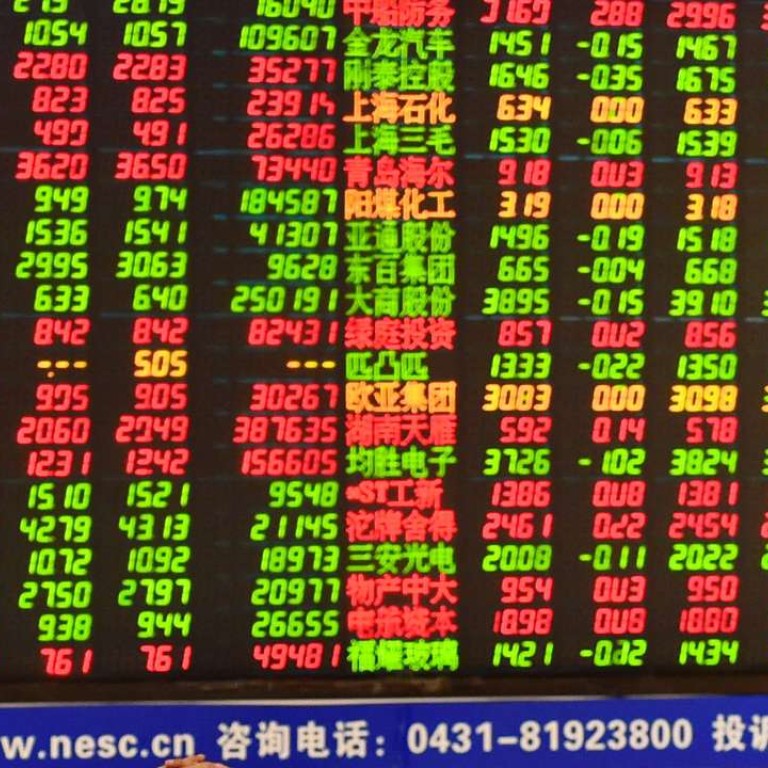
Shares slip on mainland’s first day of trading after government’s surprise rates increase
Hang Seng Index down 0.24pc at 23,129; Shanghai Composite loses 0.6pc to close at 3,140
Mainland shares closed lower on the first trading day following the Lunar New Year holiday after the Chinese central bank unexpectedly raised short-term interest rates and a private manufacturing survey missed forecasts.
Hong Kong stocks ended the week with a third straight day of losses as global political uncertainties continued to weigh on the market.
The Shanghai Composite lost 0.60 per cent or 19 points to 3,140.17, while the Shenzhen Component Index was down 0.47 per cent or 47.21 at 10,004.84. The blue-chip CSI 300 declined 0.69 per cent to 3,364.49 and the Nasdaq-style ChiNext shed 0.50 per cent to 1,876.76.
Hong Kong’s benchmark Hang Seng Index closed down 0.24 per cent, or 55.31 points, to 23,129.21 while the Hang Seng China Enterprises Index was down 0.13 per cent or 13.09 points to 9,683.23.
On Friday morning, the People’s Bank of China (PBOC) said it had raised the interest rate on open market operation reverse repurchase agreements (repos) by 10 basis points, effective on February 3, sparking concerns that more tightening policies might be on the way.
The Chinese central bank also set the yuan reference point against the US dollar on Friday at 6.8556, 0.05 per cent stronger than on January 26 before the holiday.
The banking sector saw heavy losses on the Hong Kong bourse, with Bank of East Asia sliding 1.35 per cent to HK$32.85 and Bank of China Hong Kong closing 1.30 per cent down at HK$30.45. Snack producer Want Want China led the benchmark’s drop by slumping 1.67 per cent to HK$5.29.
The Hang Seng Index fell a total of 0.99 per cent or 231.57 points in the three trading days of the week.
Castor Pang Wai-sen, head of research at Core Pacific Yamaichi, said the uncertainties created by Donald Trump’s presidency would continue to depress market confidence.
“People don’t know what he is going to do next,” Pang said. “That’s an important reason why investors dare not put money into the stock market.”
Companies linked with Chinese tycoon Xiao Jianhua, who apparently went to the mainland to help police with their enquiries during the holiday, also tumbled on the Shanghai and Shenzhen bourses. Xishui Strong Year and Baotou Huazi Industry, both of which Xiao owns substantial stakes in, fell by their 10 per cent limits.
“It could be worse as there have been two negative pieces of news hovering around the two markets in recent days,” said Alex Wong Kwok-ying, director of Ample Finance Group, referring to the disappearance of Xiao and the PBOC’s short-term interest rate rise.
Wong said investors were also cautious ahead of US employment data due to be released later on Friday.
Pang said market sentiment had also been hurt by a private survey measuring January’s Chinese factory activity. The Caixin/Markit Manufacturing Purchasing Managers’ Index (PMI) fell from December’s 51.9 to 51.0, missing a Reuters poll forecast of 51.8.
China’s official PMI released on Wednesday showed January’s reading reached 51.3 versus December’s 51.4.
Elsewhere in Asia, the Nikkei 225 in Japan ended up 0.02 per cent at 18,918.20, while the Kospi in South Korea gained 0.10 per cent to 2,073.16.
US indices were little changed on Thursday. The Dow Jones Industrial Average Index was down by just 0.03 per cent to 19,884.91, while the Nasdaq dropped 0.11 per cent to 5,636.20. The S&P 500 gained 0.06 per cent to close at 2,280.85.
Additional reporting by Jane Li


